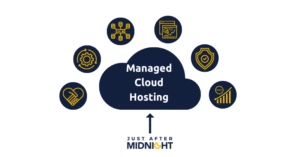Even in 2023, many teams are still tending their own cloud servers. For companies with a great in-house capacity, who can whip up a solution to meet business needs exactly – keep on keeping on.
However, this isn’t the reality for most. Here, we look at DIY hosting vs. a tailored cloud solution from a specialist. Let’s get to it.
DIY Cloud Hosting

DIY cloud hosting involves setting up and managing your own cloud hosting solution rather than teaming up with a managed cloud hosting provider.
This approach gives brands more control over their hosting environment and allows them to customise to their heart’s desire.
However, it requires serious technical know-how and resources to manage and maintain a modern infrastructure. This means:
- Creating and managing your own virtual servers
- Patching and updating
- Migrating, if you’re getting set up and your application was previously hosted on-prem or with another cloud provider
- Maintaining and optimising your infrastructure
- Securing your application and infrastructure
DIY cloud hosting is a good option for those with technical expertise who want greater environmental control. However, this may not be suitable if you lack the necessary skills or resources.
Managed cloud hosting

Managed cloud hosting is a type of hosting service in which a hosting provider takes care of managing the infrastructure and cloud computing resources on your behalf. This means the provider is responsible for maintenance, software updates, security monitoring and performance optimisation.
You’re then left to focus on your core business operation rather than fretting about the technical aspects of your website or application hosting.
Managed cloud hosting providers make sure you get exactly what you need most from your cloud, from disaster recovery to load balancing and scalability.
When to switch to managed cloud hosting?
Essentially, if you’re looking for something your in-house team can’t provide, it might be time to switch to a managed cloud provider. Plus, it’s also worth bearing in mind switching might come with benefits you aren’t even aware of.
Technical expertise and specialism
Managed cloud providers offer a team of experienced technical experts who will manage your cloud environment. This can be very advantageous if you don’t have the resources for an in-house technical team.
Further, you can work with people with niche experience. Many MSPs have industry-leading skills in security, digital customer experience – or whatever it is you’re looking for.
Scalability
Managed cloud hosting offers flexible plans that can scale up or down as per the requirements of your business. Your infrastructure/application can be scaled up or down depending on how much traffic you’re receiving.
Security
Managed cloud hosting offers advanced security features like firewalls, regular security audits and intrusion detection and prevention.
Reliability
Managed cloud hosting offers service level agreements (SLAs) that guarantee uptime, availability and performance. Ensuring that business-critical applications are always available and accessible to users. This level of reliability can help your business avoid downtime, protecting you from lost revenue, reputation and customers.
Cost
Managed cloud hosting can provide cost savings as you avoid upfront investments in hardware, software and infrastructure.
Ultimately, it depends on the specific needs and requirements of the business. If you already have the technical expertise and time to maintain your own infrastructure (kudos), you may not need managed cloud hosting.
Cloud hosting providers
Cloud hosting providers are companies that offer hosting services through a cloud infrastructure. The leading cloud providers are AWS, Microsoft Azure and Google Cloud Platform (GCP). These providers use a network of remote servers to store, manage and process data, allowing businesses to access their data and applications from anywhere in the world.
Managed hosting providers
Now you know the advantages, it’s time to think about what you might want to look for in a managed cloud hosting provider. A lot of these criteria will be decided by your application and business objectives, but there are a few proof points it’s good to check off – no matter what you’re in the market for.
End-to-end capabilities
The provider you select should be able to get you from one end of your cloud journey to the other. Look for a provider with a good range of cloud services – as well as any particular specialism.
Cloud-native expertise
Some old-school hosting providers have yet to dip their toes into cloud-native hosting. And with cloud-native technologies becoming the norm, this just isn’t going to work long term. Make sure your provider is au fait with serverless, containers and all that good stuff.
Service level agreements
Your new partner should provide you with SLAs to meet your business requirements.
At Just After Midnight you can bring your own hosting contract and we will manage it with an industry-leading support SLA to match.
Certifications
Providers should adhere to industry best practices and standards. Engineers and developers should be certified with the main cloud hosting providers, but it doesn’t stop there. Every one of the big three public clouds boasts a smorgasbord of qualifications, so make sure your new partner’s swotted up.
A great track record
Your potential provider should be able to understand what it is you’re looking for and match it with their technical expertise. You can find all our previous work here.
How we can help
As a managed cloud provider to the likes of Volvo, Amnesty International, as well as UK national fitness icon Joe Wicks’ Body Coach App, we’re perfectly placed to take the complexity off your internal team and make your cloud work for you.
So, to talk about making the switch to managed hosting, or anything else, just get in touch.




